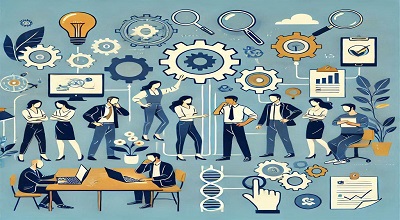Collaboration Skills
Collaboration skills refer to the ability to work effectively and efficiently with others to achieve common goals or objectives. These skills are essential in various aspects of life, including workplaces, academic settings, community projects, and personal endeavors. Collaboration involves communication, teamwork, compromise, flexibility, and problem-solving.
Here’s a breakdown of each aspect with examples:
- Communication: Clear and effective communication is fundamental to collaboration. This includes verbal and non-verbal communication skills such as active listening, articulating ideas clearly, and providing constructive feedback.
- Example: In a team meeting, an individual listens attentively to others’ suggestions, asks clarifying questions, and offers their input concisely and respectfully.
- Teamwork: Collaboration requires individuals to work together towards a common goal, pooling their strengths and resources to achieve success.
- Example: A group of employees from different departments collaborates on a project, assigning tasks based on each member’s expertise and coordinating efforts to meet deadlines.
- Compromise: Collaborative environments often necessitate compromise, where individuals must be willing to negotiate and find solutions that accommodate everyone’s perspectives and needs.
- Example: Two colleagues have differing opinions on how to approach a project. They discuss their ideas, identify common ground, and agree on a combined strategy incorporating elements from both approaches.
More here…
- Flexibility: Being adaptable and open-minded is crucial in collaboration, as situations and priorities may change, requiring individuals to adjust their plans and approaches accordingly.
- Example: A team encounters unexpected obstacles that necessitate a shift in project timelines. Members demonstrate flexibility by reallocating resources and adjusting schedules to ensure project completion.
- Problem-solving: Collaborative teams often face challenges and obstacles that require creative problem-solving skills. Individuals must work together to identify issues, brainstorm solutions, and implement effective strategies.
- Example: A community organization faces budget constraints for an upcoming event. Team members collaborate to explore alternative funding sources, negotiate discounts with vendors, and streamline event logistics to reduce costs without compromising quality.
- Respect and Trust: Collaboration thrives in an environment where team members respect each other’s expertise, perspectives, and contributions. Trust is essential for effective collaboration, fostering openness, honesty, and mutual support.
- Example: A research team trusts each member to complete their assigned tasks accurately and on time. They value each other’s expertise and contributions, fostering a supportive and respectful work environment.
Developing and demonstrating strong collaboration skills can lead to more successful outcomes, improved teamwork, and enhanced interpersonal relationships in various settings.
